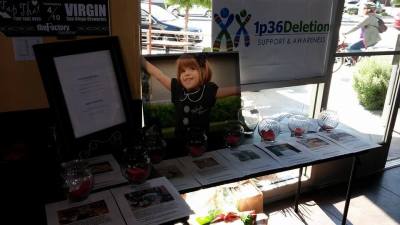
Start early – on the order of 4-6 months before you plan to have the fundraiser. This much advance planning will help you find time for everything and make it easier for you to coordinate with potential host locations. It also allows adequate time to secure donations if you pursue them as a means to raise money. Some companies require donation requests to be made with a minimum number of days or months in advance (I encountered one to be 6 months).
Follow the guidelines and recommendations in the 1p36 DSA Fundraising Guide (available at www.1p36dsa.org/fundraising).
Look for and consider a host location that you’d spend time at anyway – if it’s a fun/appealing enough place to draw you (and others) in without there being a fundraiser, it’ll already be well attended; the extra incentive to help a good cause will simply improve your turnout. Focus on local businesses instead of popular chains/franchises – the earning possibilities can be more flexible and attendees could be more generous while supporting a local business.

Promote the fundraiser at local events (where there’s already community support) and share event flyers with businesses that allow it (i.e. those that donated). Advertise as much as possible on social media: Facebook, Google+, Twitter, Evite, blogs, website forums, etc. Begin advertising at least one month in advance but increase starting 2 weeks prior – extra emphasis in the week before.
 At the fundraiser, have a well placed and visible sign that represents 1p36 DSA. You should include a photo of your child or a digital photo frame with a collection of pictures (we showed a mix of various 1p36ers). Also have a separate stand alone “donations” or “just because” vessel (vase, bowl, jar) so people can drop cash if they’re in the extra giving mood. It could be helpful to display a menu of prices (depending on what you have to offer: raffle tickets, wine/beer flights, % contributed, silent auction info, etc)
At the fundraiser, have a well placed and visible sign that represents 1p36 DSA. You should include a photo of your child or a digital photo frame with a collection of pictures (we showed a mix of various 1p36ers). Also have a separate stand alone “donations” or “just because” vessel (vase, bowl, jar) so people can drop cash if they’re in the extra giving mood. It could be helpful to display a menu of prices (depending on what you have to offer: raffle tickets, wine/beer flights, % contributed, silent auction info, etc)
 Using the above mentioned techniques, we raised over $3,200 across three separate fundraisers! With the first two, we utilized % of sales and raffles to raise money. For the 3rd, we had raffles and a simple “donations” vase in addition to a more creative way of raising money (compared to just going for a % of sales). This creative fundraising method was possible via 3 contributed kegs of beer that we received (the fundraiser was at a restaurant/gastro pub). Since the kegs of beer were completely donated, the restaurant set up a “name your price pints” promo for those beers with a stated minimum. While $5 was the minimum price, there were people donating $20 per pint; we raised much more money than we would have through a set % of sales! Additionally, there was still beer left over at the end of the fundraiser, so we held mini follow-up fundraisers to finish off the kegs and raise more money.
Using the above mentioned techniques, we raised over $3,200 across three separate fundraisers! With the first two, we utilized % of sales and raffles to raise money. For the 3rd, we had raffles and a simple “donations” vase in addition to a more creative way of raising money (compared to just going for a % of sales). This creative fundraising method was possible via 3 contributed kegs of beer that we received (the fundraiser was at a restaurant/gastro pub). Since the kegs of beer were completely donated, the restaurant set up a “name your price pints” promo for those beers with a stated minimum. While $5 was the minimum price, there were people donating $20 per pint; we raised much more money than we would have through a set % of sales! Additionally, there was still beer left over at the end of the fundraiser, so we held mini follow-up fundraisers to finish off the kegs and raise more money.
Some of the raffle items that were donated and offered in raffle packages included gift cards/certificates to local businesses (restaurant, retail and service/entertainment), gift baskets, wine, beer, chocolate, coffee and merchandise/clothing. Some of the more popular raffle options were spa packages, an iPod nano and Disneyland tickets, in addition to area-centric packages that included a collection of donations from businesses in a common area/community.
Hopefully this feedback and shared experience helps steer you in the right direction – it should with the aid of the 1p36 DSA Fundraising Guide. Go out there, have some fun and create awareness while raising money for the organization!
Jon and Diana Marshall